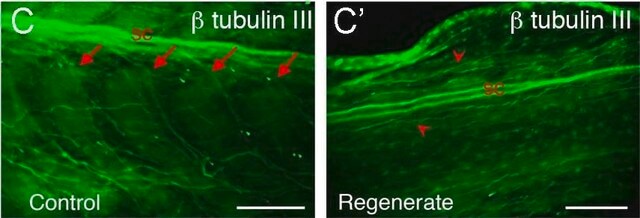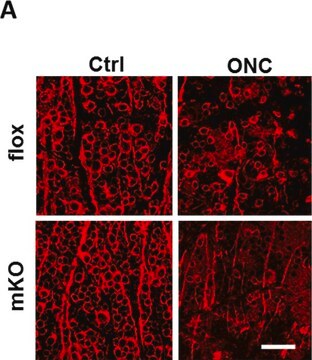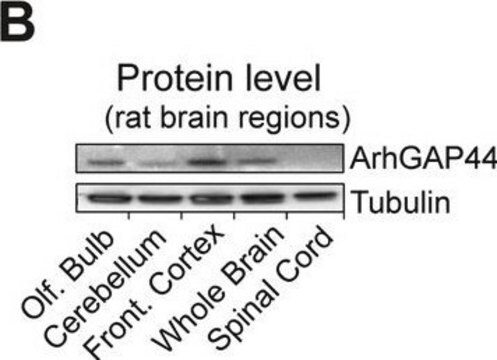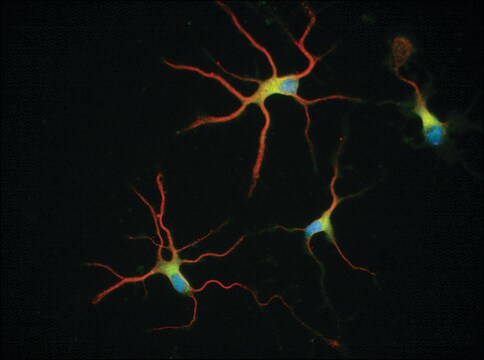おすすめの製品
由来生物
rabbit
品質水準
抗体製品の状態
affinity isolated antibody
抗体製品タイプ
primary antibodies
クローン
polyclonal
化学種の反応性
mouse
包装
antibody small pack of 25 μg
メーカー/製品名
Chemicon®
テクニック
western blot: suitable
NCBIアクセッション番号
UniProtアクセッション番号
輸送温度
ambient
保管温度
2-8°C
ターゲットの翻訳後修飾
unmodified
遺伝子情報
mouse ... Tubb3(22152)
特異性
Beta III Tubulin. By Western blot the antibody recognizes a band at ~50 kDa on mouse brain lysate. No reactivity with 3T3 cell lysate by Western blot.
It is expected that the antibody will react with most mammalian species.
免疫原
Synthetic peptide from human beta III tubulin.
アプリケーション
Research Category
ニューロサイエンス
ニューロサイエンス
Research Sub Category
神経細胞及びグリアマーカー
ニューロフィラメント及び神経細胞代謝
神経細胞及びグリアマーカー
ニューロフィラメント及び神経細胞代謝
Anti-β III tubulin Antibody is an antibody against β III tubulin for use in WB.
Western blot: 0.05-0.1 μg/mL on mouse brain lysate.
Optimal working dilutions must be determined by end user.
Optimal working dilutions must be determined by end user.
品質
Tested
物理的形状
ImmunoAffinity Purified
Format: Purified
Liquid in PBS with 0.1% sodium azide.
保管および安定性
Maintain at 2-8°C in undiluted aliquots for up to 6 months after date of receipt.
その他情報
Please refer to lot specific datasheet.
法的情報
CHEMICON is a registered trademark of Merck KGaA, Darmstadt, Germany
免責事項
Unless otherwise stated in our catalog or other company documentation accompanying the product(s), our products are intended for research use only and are not to be used for any other purpose, which includes but is not limited to, unauthorized commercial uses, in vitro diagnostic uses, ex vivo or in vivo therapeutic uses or any type of consumption or application to humans or animals.
適切な製品が見つかりませんか。
製品選択ツール.をお試しください
保管分類コード
12 - Non Combustible Liquids
WGK
WGK 2
引火点(°F)
Not applicable
引火点(℃)
Not applicable
適用法令
試験研究用途を考慮した関連法令を主に挙げております。化学物質以外については、一部の情報のみ提供しています。 製品を安全かつ合法的に使用することは、使用者の義務です。最新情報により修正される場合があります。WEBの反映には時間を要することがあるため、適宜SDSをご参照ください。
Jan Code
AB15708-25UG:
AB15708:
試験成績書(COA)
製品のロット番号・バッチ番号を入力して、試験成績書(COA) を検索できます。ロット番号・バッチ番号は、製品ラベルに「Lot」または「Batch」に続いて記載されています。
Generation of the SCN1A epilepsy mutation in hiPS cells using the TALEN technique.
Chen, W; Liu, J; Zhang, L; Xu, H; Guo, X; Deng, S; Liu, L; Yu, D; Chen, Y; Li, Z
Scientific Reports null
Oscar Diaz-Horta et al.
Journal of molecular medicine (Berlin, Germany), 96(11), 1227-1238 (2018-10-04)
RIPOR2 (previously known as FAM65B) localizes to stereocilia of auditory hair cells and causes deafness when its function is disturbed by mutations. Here, we demonstrate that during the morphogenesis of the hair cell bundle, absence of Ripor2 affects the orientation
Victoria M Ho et al.
Molecular and cellular neurosciences, 61, 1-12 (2014-05-03)
AMPA-type glutamate receptors mediate fast, excitatory neurotransmission in the brain, and their concentrations at synapses are important determinants of synaptic strength. We investigated the post-transcriptional regulation of GluA2, the calcium-impermeable AMPA receptor subunit, by examining the subcellular distribution of its
Antoine G Almonte et al.
Journal of neurochemistry, 124(1), 109-122 (2012-11-02)
Protease-activated receptor-1 (PAR1) is an unusual G-protein coupled receptor (GPCR) that is activated through proteolytic cleavage by extracellular serine proteases. Although previous work has shown that inhibiting PAR1 activation is neuroprotective in models of ischemia, traumatic injury, and neurotoxicity, surprisingly
資料
Human iPSC neural differentiation media and protocols used to generate neural stem cells, neurons and glial cell types.
ライフサイエンス、有機合成、材料科学、クロマトグラフィー、分析など、あらゆる分野の研究に経験のあるメンバーがおります。.
製品に関するお問い合わせはこちら(テクニカルサービス)





